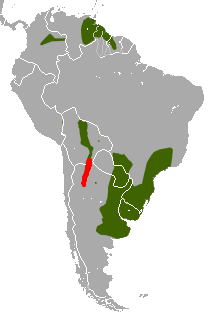Massoia's lutrine opossum facts for kids
Quick facts for kids Massoia's lutrine opossum |
|
|---|---|
| Conservation status | |
| Scientific classification |
|
| Kingdom: | Animalia |
| Phylum: | Chordata |
| Class: | Mammalia |
| Infraclass: | Marsupialia |
| Order: | Didelphimorphia |
| Family: | Didelphidae |
| Genus: | Lutreolina |
| Species: |
L. massoia
|
| Binomial name | |
| Lutreolina massoia Martínez-Lanfranco, Flores, Jayat, & D'Elía, 2014
|
|
 |
|
| Massoia's lutrine opossum range (red) | |
| Script error: The function "autoWithCaption" does not exist. | |
Script error: No such module "Check for conflicting parameters".
The Massoia's lutrine opossum (Lutreolina massoia) is a type of opossum that lives in South America. It looks a bit like an otter, which is why it's called 'lutrine' (meaning otter-like). This small mammal is found in certain parts of Bolivia and Argentina.
Contents
Discovering the Massoia's Lutrine Opossum
For a long time, scientists thought the Massoia's lutrine opossum was just a group of the big lutrine opossum (L. crassicaudata) living far away. But in 2014, a special study showed it was actually its own unique species. This means it's different enough to have its own name!
How a New Species Appears
Scientists think that long ago, the ancestors of these opossums could travel across an area called the Gran Chaco. This was possible because the climate was different, and there was more plant life. Later, the Chaco became drier, which separated the opossums into two groups. Over a very long time, these groups changed and became two different species.
Who Was Elio Massoia?
This opossum was named after an Argentine scientist named Elio Massoia. He studied many different mammals in South America. Mr. Massoia was one of the first people to notice that the Lutreolina opossums living in the Yungas region seemed special and different.
Where It Lives
The Massoia's lutrine opossum lives in south-central Bolivia and northern Argentina. In Argentina, it is found only in the Yungas region. This area is located just east of the Andes Mountains.
Its Favorite Home
This opossum prefers different places to live compared to its relative, the big lutrine opossum. It mostly lives in lowland savanna grasslands. It especially likes areas with lots of thick plants on the ground. It also seems to enjoy places near water, like rivers or ponds.
What It Looks Like
The Massoia's lutrine opossum is smaller than the big lutrine opossum (L. crassicaudata). Scientists can also tell them apart by looking at their skulls. The Massoia's opossum has a different size and shape of skull. Its teeth are also different from its larger cousin.
See also
 In Spanish: Zarigüeya de cola gruesa yungueña para niños
In Spanish: Zarigüeya de cola gruesa yungueña para niños
 | Roy Wilkins |
 | John Lewis |
 | Linda Carol Brown |


